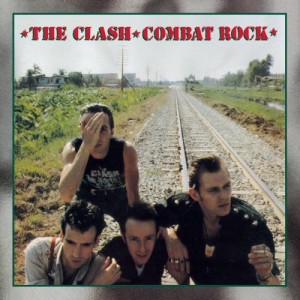
Not Counting “Cut The Crap” (1985), “Combat Rock” Was The Final Album By The Clash. It Was Produced By Glyn Johns, And It Saw Release In 1982.
This was The Clash’s final album. And no, I haven’t forgotten that thing released by Strummer and Simonon backed by a bunch of scabs in 1985 named “Cut The Crap”. “We Are The Clash”, my ass. That was a tremendous blunder, and the band knew as much – no tracks from it were included on the otherwise career-spanning “The Clash On Broadway” (1991).
“Combat Rock” was conceived as the direct sequel to the ambitious “Sandinista!”, an album that many felt had been weighed down by Strummer’s own aspirations. He clearly wanted to move the band into other styles (with black music topping the list), and Mick Jones wanted to stick to rock & roll. Those differences could not be reconciled, and Jones was to leave the band after touring “Combat Rock” – an experience that included opening for The Who during their whole farewell tour, and playing to highly disinterested audiences at that.
Originally, “Combat Rock” was to be a double album named “Rat Patrol From Fort Bragg”. However, when experienced producer Glyn Johns was called in to oversee the recording he convinced the band to release a single disc.
Everybody hated “Combat Rock” at the time. Shareef didn’t like it, and neither did the punks and the press. The charge was that the band had “sold out”. That only made sense if you looked at the singles that were issued: “Know Your Rights”, “Should I Stay Or Should I Go” and “Rock The Casbah”. The first two were simple songs in the worst sense of the word, and the other was a funky number that became their biggest seller in the US. It was a more respectable song than the other two, but the finger-popping melody made for instant criticism by people who wanted the band to stick to their rebellious selves. They once had fought the (unsanctioned) release of the poppy “Complete Control”. Now, they were willingly releasing a radio-made song themselves.
In actuality, “Rock The Casbah” was largely the work of drummer Topper Headon. He played the drums, bass and keyboards on that song. According to the rest of the band, The “Casbah” riff was one he had been toying with for ages. When recording Combat Rock, he went into the studio one morning and put all those instruments down. Strummer came up with the lyrics after reading how people would be lashed on Iran for owning rock records. Much later down the line, he reportedly cried when he learned that American pilots used the expression “rock the casbah” as a euphemism for their bombing missions in Iraq.
The argument that the band was selling out made just no sense when one played the full album. To begin with, there was precious little radio-friendly music there. In fact, there was virtually no rock & roll to be found anywhere.
Don’t spin “Combat Rock” looking for variations of “Should I Stay Or Should I Go” because you are not getting that. You are getting reggae on “Car Jammin’”, the world beats of “Sean Flynn”, the pop of “Inoculated City”, the funk of “Overpowered By Funk” (complete with an impersonation of Tarzan!) and even a collaboration with poet Allen Ginsberg.
The story goes that Ginsberg wanted The Clash to back him on an album he was attempting to put together, but he was to end backing them on “Combat Rock”. He asked them for words and phrases that were associated with punk, and then the beat luminary recited along as the band played “Ghetto Defendant”.
And how often does a band record a sell out album with a track named “Straight To Hell”? A song dealing with US politics and the plight of Amerasians on the wake of Vietnam, “Straight To Hell” will always stand as one of the band’s most forceful compositions. The almost infantile backing (with Strummer hitting the bass drum from the front with a lemonade bottle wrapped in a towel) makes you lower your guard, and before you know the brilliant lyrics have all landed lethally.
In the end, “Combat Rock” was clearly the work of a band that was no longer able to stay united. “Should I Stay Or Should I Go” (Mick Jones’ self-confessed attempt to come up with a classic) and songs like “Straight To Hell” marked a definitive degree of separation. The frontmen of The Clash were no longer able to find an equation that would let them keep working together and do what everybody expected from what was once called “the only band that mattered”.
Once Jones left (or he was kicked by the others – it depends on which version you have read), Joe Strummer and Paul Simonon tried to recapture the band’s zest and failed ignominiously. The Clash city rockers ended right there. The death of Strummer in 2002 closed the story for good, at a time in which a reunion was heavily-rumored. Their inspirational force, however, is something that will never die down. Led by Strummer, they democratized music. They moved from one genre to the other without really losing expressivity or significance. They called out from London and reached the whole world. They fought the law. And they won a victory for just everybody.
Rating: 7.5/10

Pingback: The Clash – General Introduction | MusicKO
Pingback: Month In Review – October 2010 | MusicKO